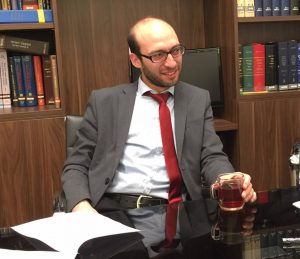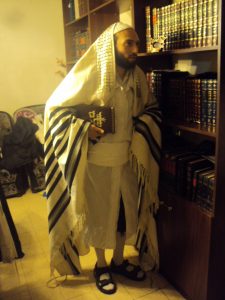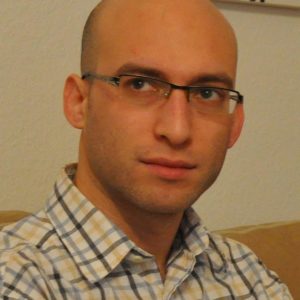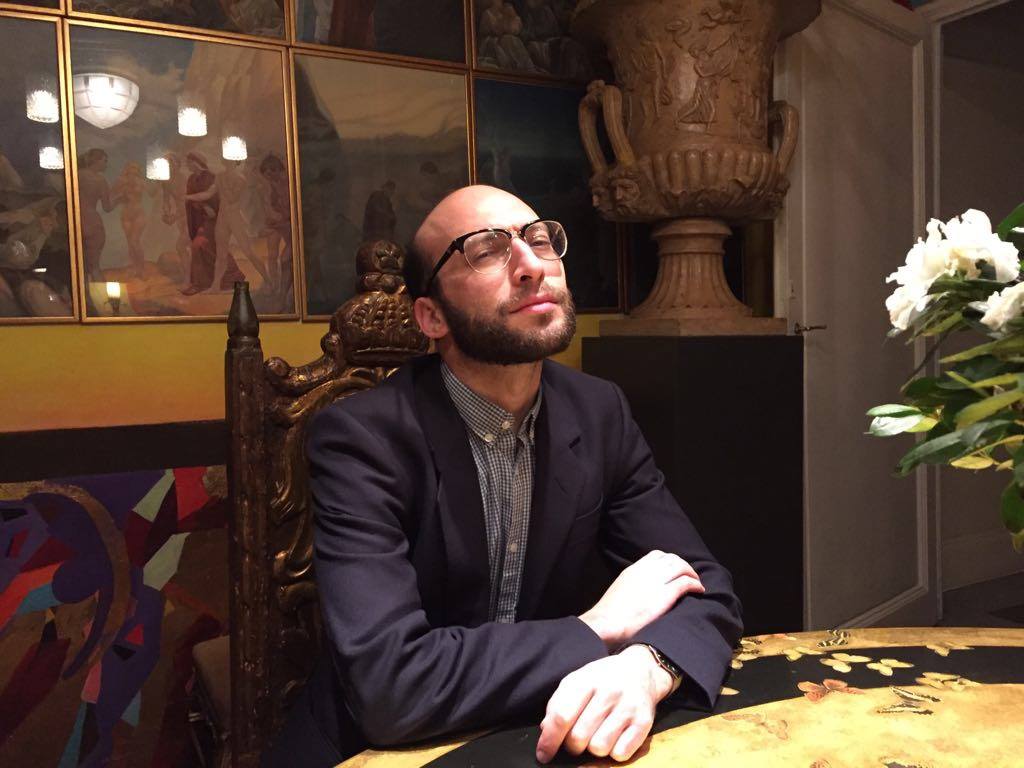 Akiva Weingarten was born in New York in 1984, the oldest of a family of 11 children. At 18, he moved to Israel where he lived for 10 years. Akiva got his first Smicha (rabbinical ordination) from a Chassidish Yeshiva in Monsey, NY at the age of 17 and was ordained again 8 years later by a Litvish Bet Din in Bnei Brak, Israel. At the age of 26, he received his third ordination from Rabbi Zalman Schachter-Shalomi, founder of the Jewish Renewal movement. Today, Akiva is a rabbinical student at the Abraham Geiger College and the Potsdam University in Germany (Update: as of August 2019, Rabbi Akiva Weingarten is the Rabbi of the city of Dresden and the Liberal Jewish community in Basel).
Akiva Weingarten was born in New York in 1984, the oldest of a family of 11 children. At 18, he moved to Israel where he lived for 10 years. Akiva got his first Smicha (rabbinical ordination) from a Chassidish Yeshiva in Monsey, NY at the age of 17 and was ordained again 8 years later by a Litvish Bet Din in Bnei Brak, Israel. At the age of 26, he received his third ordination from Rabbi Zalman Schachter-Shalomi, founder of the Jewish Renewal movement. Today, Akiva is a rabbinical student at the Abraham Geiger College and the Potsdam University in Germany (Update: as of August 2019, Rabbi Akiva Weingarten is the Rabbi of the city of Dresden and the Liberal Jewish community in Basel).
Hi Akiva! How would you describe your family background from a religious point of view?
I would say that my family is the most typical Chassidishe family, no BT background, 100% Ashkenazi. I learned in Satmar, my father and grandfather are both Dayanim (religious judges), my mother is a teacher and speaker, all my brother-in-laws went or still go to Kollel, as does my wider family.
How would you describe your childhood: was it a happy one?
I wouldn’t say a “happy” one, but It was definitely an interesting one. Over the years I learned in 6 Yeshivot, 4 in New York and 2 in Israel. I was never thrown out because I did something really bad. I remember one time when I was thrown out my father asked the Mashgiach if I’m such a bad student that he can’t have me anymore, he said: “No, we have students that learn less than him, we have students that do worse things too, but Akiva is a ‘manhig’ (leader), and I can’t have that here.” In other words, I was too independent a thinker and the system can’t deal with that.
Did your independent thinking cause doubts at an early age?
I think that my independent thinking is what scared them the most. I remember seeing “another brick in the wall” for the first time and thinking to myself how accurately this describes our school system, where there is no room for creative thinking or anything remotely outside the strict box. The problem is that our teachers themselves never did any thinking, otherwise they would never get the job.
Could you describe your education further?
Like I said, I went through 6 Yeshivot in only 6 years. For places where independent thinking is looked down upon, that actually makes sense. When I was 30, I started to attend University. It was then that I realized how closed our system really was, a place where basic normal questions of trying to understand can get you thrown out of Yeshiva. The problem there really is that the Rabbis themselves never took the time to try and understand. They don’t know the answers and are just obeying the rules blindly.
#SAD…
Were you married off or did you manage to escape this?
I was engaged by the age of 19 and by 22 already had 2 kids. Of course, by a traditional Shidduch. We were never meant to be together but I tried for 10 years to make it work, as the custom often is.
 How did your wife at that time handle your apostasy?
How did your wife at that time handle your apostasy?
She’s a very simple women and still today does not really understand what it’s about, I tried to explain it to her but gave up quite fast after seeing she will never get it. I know that she ran around to Rabbis that know me to tell them about my terrible sins. None of them ever spoke to me, they just told her to daven for me and sent other people, those considered to “know,” to talk to me.
Do you still have contact with your children?
Yes. My three children live in Israel with their mother. We have a pretty good contact, we skype all the time and see each other every 2-3 months when I go there. You probably never heard of them because they are not a substantial part of my public life. I try to keep them safe by not involving them in everything I do. They need to grow up in a healthy environment and not be thrown around between the world they grew up in and the way I live, at least as long as they’re young. When they are older, they will be able to choose what kind of life they want to live.
Did your family cut off contact with you?
Some did. But, surprisingly, I have very good contact with my immediate family (parents, siblings and grandparents). My lovely mother, a very Chassidishe “Rebbetzin”, actually leads a group for mothers of OTDs, where she encourages them to keep contact with their children. I even had the privilege of talking with them the last time I was in NY. I think that the attitude is slowly changing. The Rabbis are seeing the numbers and, in many cases, they understand the reasons why people are leaving the community. And they are adapting, allowing parents or even encouraging them to keep contact. It may initially not be for the right reasons, but we all know “Mitoch shelo lishmah, ba lishmah” (what starts for the wrong reasons, may end with the right reasons).
You landed up in Berlin, Germany, just like Deborah Feldman. Could you describe the process to me?
I think that we both came here for different reasons. I came here because Germany offers great academic opportunities and that’s where my heart was pulled towards. I am not sure about Deborah, but Berlin has a lot to offer and there are many reasons to be here. BTW, interestingly, although we are around the same circles of friends and know of each other, we have never actually met.
How come?
From what I understood she’s not interested in having any sort of “Jewishness” in her life but you’ll have to ask her…
What drove you to become a Rabbi, of all possible professions?
I worked as a Rabbi in the past in the community in Lodz and I was also a Mashgiach in two Yeshivahs in Israel (Tiferet Shmuel and Sha’ar Hatalmud). I didn’t actually think I would ever be “Jewish” again. It was my non-Jewish girlfriend at the time that pushed me to start Jewish studies in the university for technical reasons. With time I saw how much I still enjoy “Jewishness” even if I don’t believe in it the same way I was brought up. Many people around me would already refer to me as their Rabbi so it came to me in a natural way.
Why did you choose Liberal Judaism?
When you read the old Jewish texts, you see that Jewish traditions were changed to fit reality throughout all of Jewish history, even the ones about which people like the charedim claim to have never changed. All went through mass changes and reforms, even if some like to deny it.
I think Liberal Judaism has something very unique about it. It is a place that is always open for change. Every part can be rethought and reconsidered. There’s no such a thing as a question that “should never be asked,” which is unlike our upbringing. I also feel that with my background I bring something new to the Liberal table. And they seem to be enjoying it at least as much as I do.
Looking back at the path your life has taken; what would you have done differently? And why?
I don’t necessarily believe that “everything happens for a reason,” but I still see many positive things that came out of the path my life has taken and I’m very grateful for them. However, If had the knowledge I have now, I would not have gotten married. And that’s something I think is very important for people to know: NEVER get married just because you are “supposed” to or because you don’t want your younger siblings to “skip” you.
 Looking ahead, how do you see your own future?
Looking ahead, how do you see your own future?
I came to see that we OTDs have a lot to offer in the outside Jewish world. I think It’s a shame that so many of us choose to connect Haredism with Judaism, which is way larger and has way more room than what we grew up with.
When you really think of it, the vast majority of Jews today are neither Haredim nor Orthodox. We, the so-called non-religious Jews are the real Jews, numerically and historically. We should be proud of who we are, hold our heads high and continue with whatever we are doing, regardless of what some middle age black hatters in Brooklyn or Bnei Brak think of us.
Any last thing you would like to pass along for people leaving the fold?
I think that people that are thinking of leaving should not take this decision lightly. The transition is really difficult, the gaps are huge, and the learning and adapting part is neverending. Therefore, I would never try to convince someone to leave.
It gets easier though with time, and with the help of others that already took that step it can be manageable. We are also in the midst of opening an organization here in Berlin to help OTDs as well. But one thing is for sure, 90% of the things we fear will happen will never actually happen.


Leave a Reply